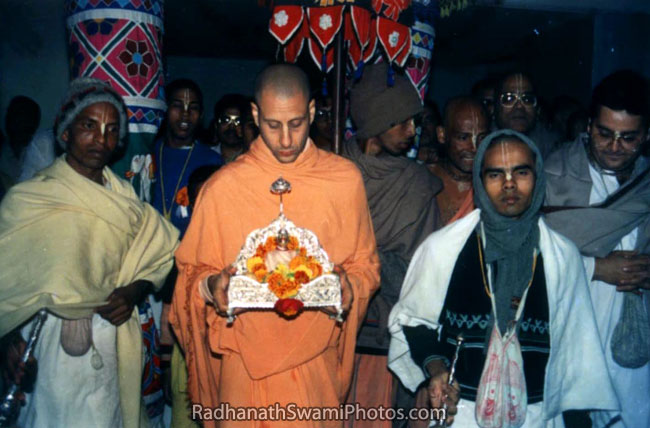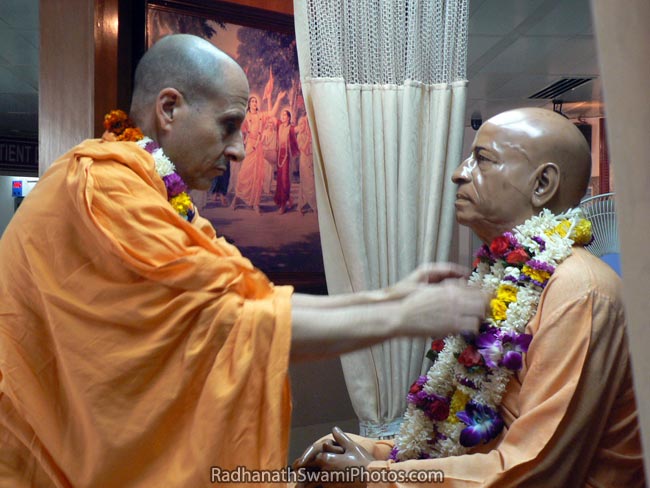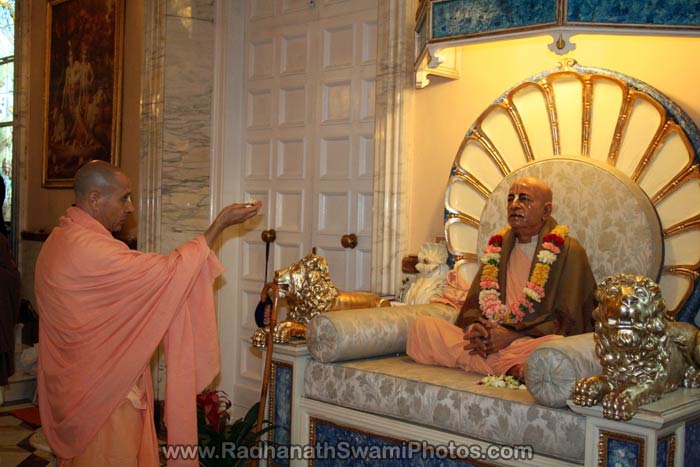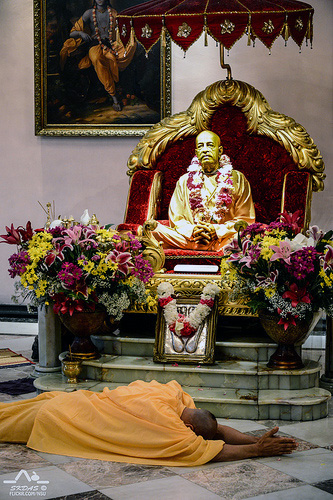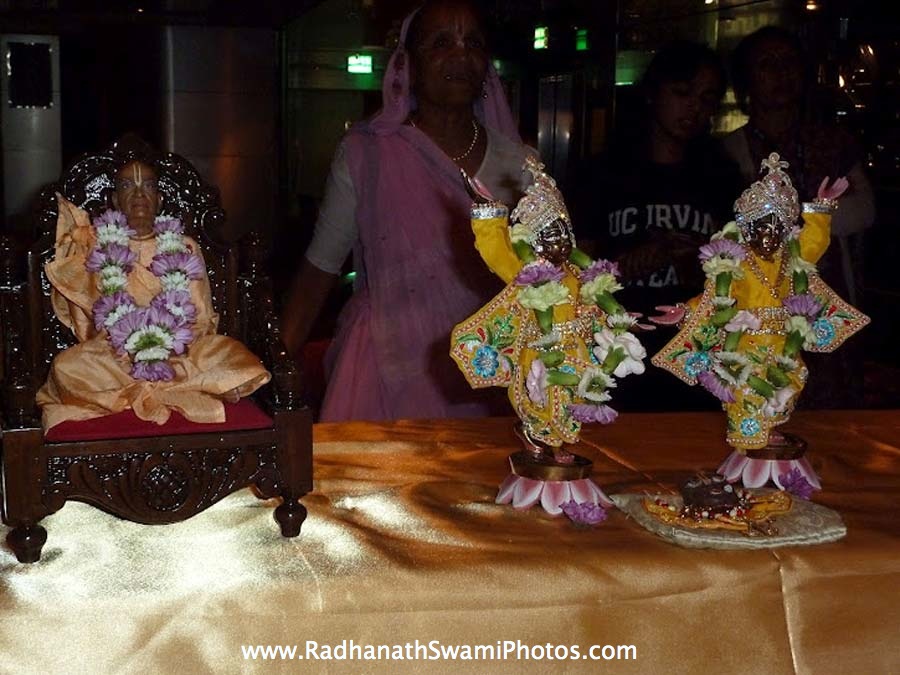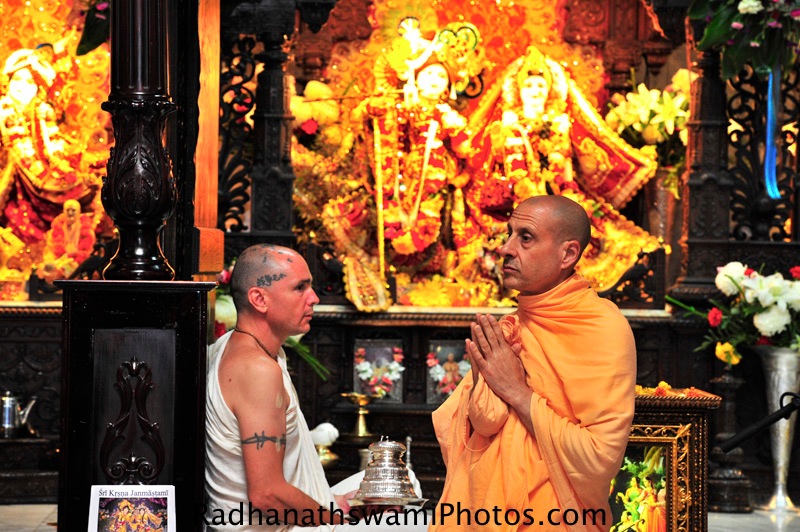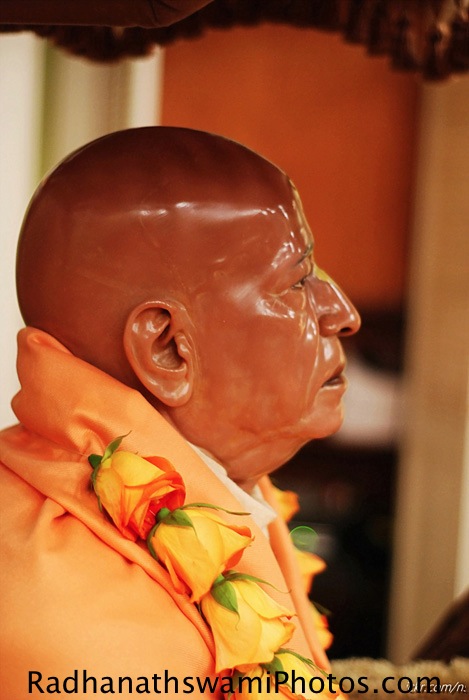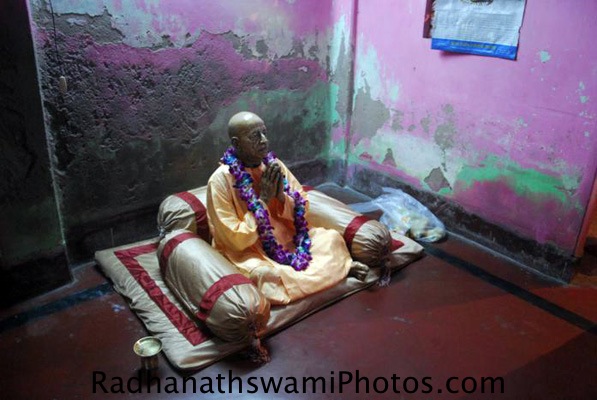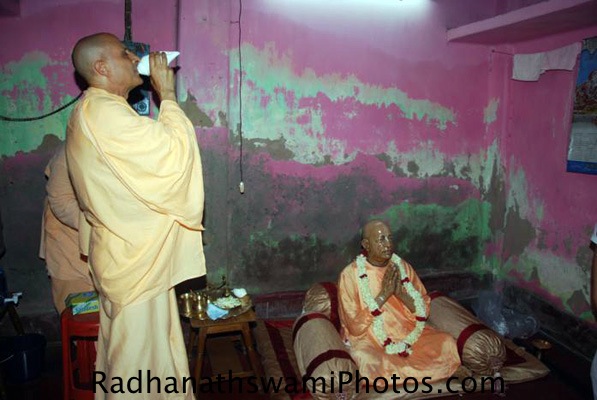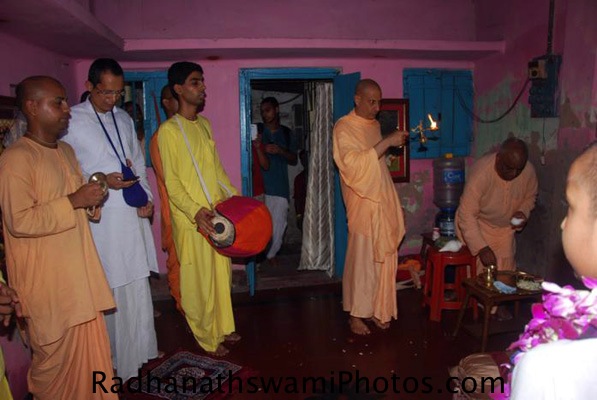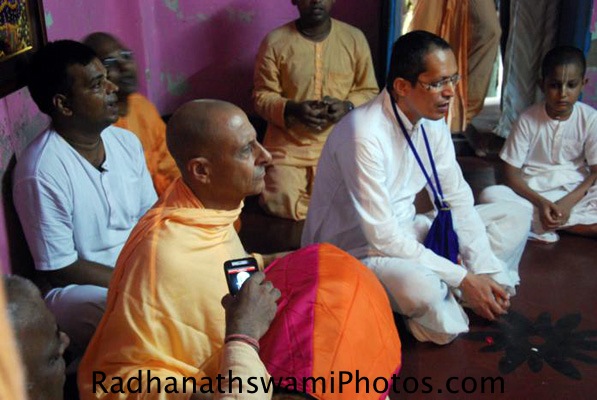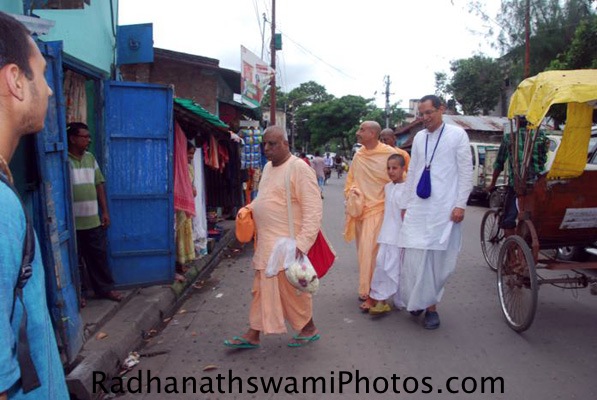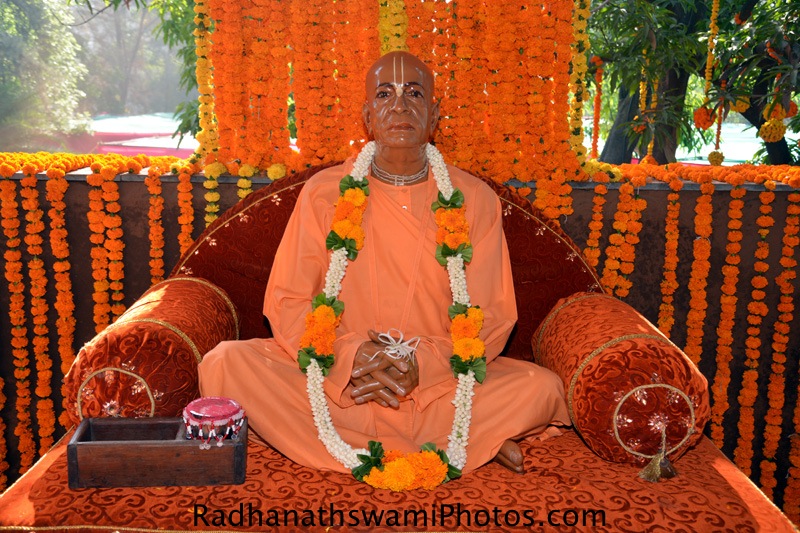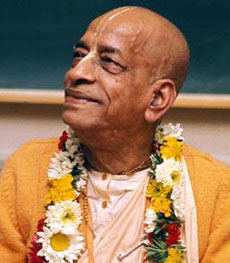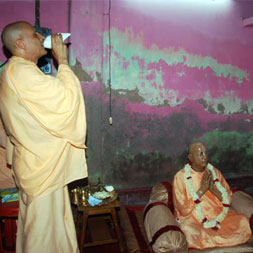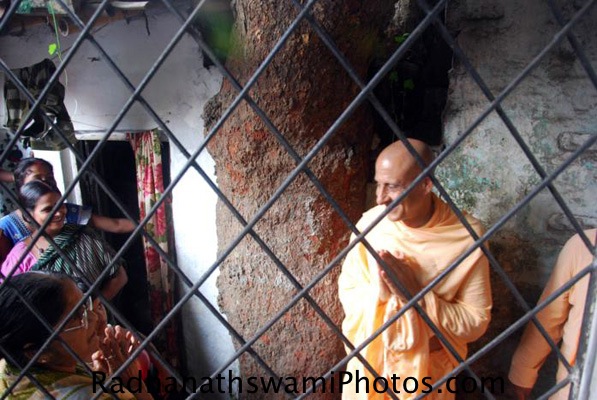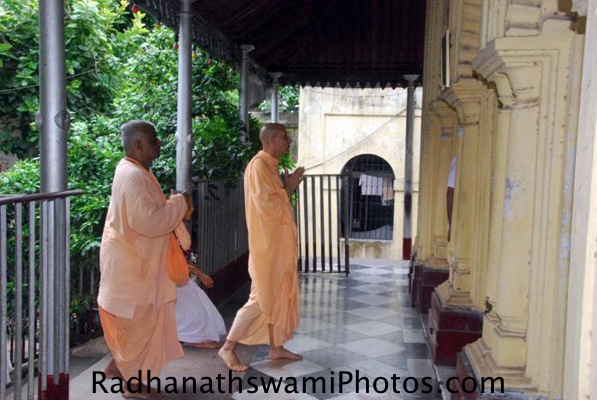His Divine Grace A. C. Bhaktivedanta Swami Prabhupada
– Founder Acarya of ISKCON
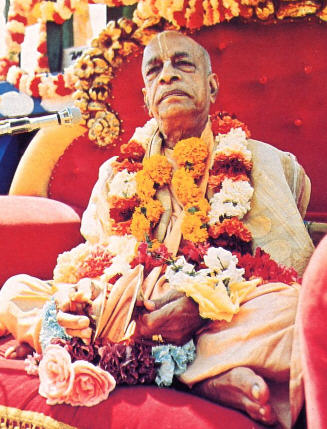
His Divine Grace A. C. Bhaktivedanta Swami Prabhupada, founder Acarya of The International Society of Krishna Consciousness, accepted Radhanath Swami as his student and disciple in Vrindavan, India, 1971.
“Srila Prabhupada lived with the spirit of the Lord’s compassion shining through his heart. Through his example he showed how to live as a true well wisher and friend of every living being. The genuine essence of all spiritual teachings can be understood by observing his qualities, hearing his words and reading his books.” – Radhanath Swami
His Divine Grace, A.C. Bhaktivedanta Swami Prabhupada (1896-1977) is widely regarded as the worlds pre-eminent exponent of the teachings and practices of Bhakti-yoga to the Western world.
Born Abhay Charan De on September 1, 1896, in Calcutta, as a youth he became involved with Mahatma Gandhi’s civil disobedience movement. It was, however, a meeting with a prominent scholar and spiritual leader, Srila Bhaktisiddhanta Sarasvati, which proved most influential on young Abhay’s future calling. Upon their first meeting Srila Bhaktisiddhanta, who represented an ancient tradition of Bhakti (devotional yoga), asked Abhay to bring the teachings of Krishna to the English-speaking world. From birth, Abhay had been raised in a family devoted to Krishna – the name meaning the all-attractive, all-loving Lord. Deeply moved by Srila Bhaktisiddhanta’s devotion and wisdom, Abhay became his disciple and dedicated himself to carrying out his mentor’s request. But it wasn’t until 1965, at the age of seventy, that he would set off on his mission to the West.
Having since been awarded the honorary title of Bhaktivedanta in recognition of his learning and devotion, and having taken the vows of sannyasa (renunciation), Abhay Charan, now known as Bhaktivedanta Swami, begged free passage and boarded a cargo ship to New York. The journey proved to be treacherous, and the elderly spiritual teacher suffered two heart attacks aboard ship. After 35 days at sea he finally arrived at a lonely Brooklyn pier with just seven dollars in Indian rupees and a crate of his translations of sacred Sanskrit texts.
In New York he faced great hardships without money or a place to live. He began his mission humbly, by giving classes on the Bhagavad-gita in lofts on the Bowery, New York’s infamous skid row, and leading kirtan (traditional devotional chants) in Tompkins Square Park. His message of peace and goodwill resonated with many young people, some of whom came forward to become serious students of the Krishna-bhakti tradition. With the help of these students, Bhaktivedanta Swami rented a small storefront on New York’s Lower East Side to use as a temple. After months of hardship and struggle, in July of 1966, Bhaktivedanta Swami established the International Society for Krishna Consciousness for the purpose of checking the imbalance of values in the world and working for real unity and peace. He taught that each soul is part and parcel of the quality of God and that one could find true happiness through living a simpler, more natural way of life and dedicating one’s energy in the service of God and all living beings.
Having begun initiating his American followers into the Gaudiya Vaishnava lineage, Bhaktivedanta Swami next traveled to San Francisco. Amidst the emerging hippie community in the Haight-Ashbury district, during 1967’s “Summer of Love” he taught that the experience of devotion through kirtan was a spiritual “high” superior to any pleasures derived from material sources such as wealth, fame, or intoxication. In the following months many more came forward to assist him. Desiring to address him with the respect due a revered spiritual teacher, his disciples began to call him Srila Prabhupada, meaning “one at whose feet the masters sit”.

Radhanath Swami with his Spiritual Master
In the eleven years that followed, Srila Prabhupada circled the globe fourteen times, bringing the teachings of Bhakti to thousands of people on six continents. Men and women from all backgrounds came forward to accept his message. With their help, Srila Prabhupada established centers and projects throughout the world including temples, rural communities, educational institutions, and what would become the world’s largest vegetarian food relief program. With the desire to nourish the roots of Krishna-bhakti in its home, Srila Prabhupada returned to India several times, where he sparked a revival in the Bhakti tradition. In India, he opened dozens of temples, including important centers in the holy towns of Vrindavana and Mayapur.
Perhaps Srila Prabhupada’s most significant contribution is his books. He authored over seventy volumes on Bhakti-yoga, which are highly respected for their authority, depth, clarity, and fidelity to tradition. His writings have been translated into seventy-six languages. His most prominent works include: Bhagavad-gita As It Is, the thirty-volume Srimad-Bhagavatam, and the seventeen-volume Sri Caitanya-caritamrita.
For millennia the teachings of Bhakti-yoga had been concealed within Sanskrit and Indian vernacular languages, and the rich culture of Bhakti had been hidden behind the borders of India. Today, millions around the globe express their gratitude to Srila Prabhupada for revealing the timeless wisdom of Bhakti to a world immersed in a materialistic and self-destructive ethos.
A. C. Bhaktivedanta Swami Prabhupada passed away on November 14, 1977, in the holy town of Vrindaban, surrounded by his loving disciples who carry on his mission today.
APPRECIATIONS OF SRILA PRABHUPADA
“Swami Bhaktivedanta came to the USA and went swiftly to the archetype spiritual neighborhood, New York’s Lower East Side, and installed intact an ancient, perfectly preserved piece of street India. He adorned a storefront as his Ashram and adored Krishna therein. By patience, good humor, and singing and chanting and expounding Sanskrit terminology, he day-by-day established Krishna consciousness in the psychedelic center of America East. He and his children sang the first summer through in Tompkins Square…To choose to attend to the Lower East Side, what kindness and humility and intelligence ….The main thing, above and beyond all our differences, was an aroma of sweetness that he had, a personal, selfless sweetness like total devotion. And that was what always conquered me” – Allen Ginsberg
“The thing that always stays is his saying, “I am the servant of the servant of the servant.” I like that. A lot of people say, “I’m it. I’m the divine incarnation. I’m here and let me help you.” You know what I mean? But Prabhupada was never like that. I liked Prabhupada’s humbleness. I always liked his humility and his simplicity. The servant of the servant of the servant is really what it is, you know. He just made me feel so comfortable. I always felt very relaxed with him, and I felt more like a friend. I felt that he was a good friend. Even though he was at the time seventy-nine years old, working practically all through the night, day after day, with very little sleep, he still didn’t come through to me as though he was a very highly educated intellectual being, because he had a sort of childlike simplicity. Which is great, fantastic. Even though he was the greatest Sanskrit scholar and a saint, I appreciated the fact that he never made me feel uncomfortable. In fact, he always went out of his way to make me feel comfortable. I always thought of him as sort of a lovely friend, really, and now he’s still a lovely friend…Srila Prabhupada has already had an amazing effect on the world. There’s no way of measuring it. One day I just realized, “God, this man is amazing!” He would sit up all night translating Sanskrit into English, putting in glossaries to make sure everyone understands it, and yet he never came off as someone above you.” – George Harrison
“Swami Bhaktivedanta brings to the West a salutary reminder that our highly activistic and one-sided culture is faced with a crisis that may end in self-destruction because it lacks the inner depth of an authentic metaphysical consciousness. Without such depth, our moral and political protestations are just so much verbiage” – Thomas Merton, Catholic theologian, monk, author
‘When I first met the students of Srila Prabhupada, I can remember thinking how surprised I was, and I wondered what this meant..But as I came to know the movement, I came to find that there was a striking similarity in the essence of what they were teaching and in the original core of Christianity-that is, living simply, not trying to accumulate worldly goods, living with compassion towards all creatures, sharing, loving, and living joyfully. I am impressed with how much the teachings of one man and the spiritual tradition he brought impacted themselves into the lives of so many people. In my view Srila Prabhupada’s contribution is a very important one and will be a lasting one….This life of Srila Prabhupada is pointed proof that one can be a transmitter of truth and still be a vital and singular person. At what almost anyone would consider a very advanced age, when most people would be resting on their laurels, he harkened to the mandate of his own spiritual teacher and set out on the difficult voyage to America. Srila Prabhupada is one in a thousand, maybe one in a million” – Harvey Cox, Professor of Divinity, Harvard University
“Srila Prabhupada gave meaning to many whose lives had become meaningless during the countercultural revolution. In a time of prosperity, many American youth have felt a disdain for the materialistic goals of the established culture. They have not felt that earning more money to spend on sensual pleasures has given an abiding happiness to their parents. They have come to believe that there must be a more valuable transcendental reality which they have yet to find. Therefore, they have not found direction toward a goal in our established culture, nor have they found meaning in the mainline religions that have supported this culture. For these people, Srila Prabhupada has provided a meaningful place which bears witness to quite different objectives, and he has provided a strict discipline by means of which one may achieve them. So this, I think, was one of his greatest contributions….I certainly honor Srila Prabhupada as one of India’s pre-eminent scholars. As a translator of many of India’s important religious texts, he gave special attention to the spirit and beauty of the texts.. Srila Prabhupada, in his translations, really captured their essential spirituality. A literal translation which lacks sympathetic reverence for the text itself can obscure rather than elucidate its profound inner meaning. I find that Srila Prabhupada’s translations bring these works to life….Due to his unstinting and diligent labors, the whole world now has been made aware of the devotional essence of the Indian spiritual tradition, as well as of one of India’s great saints, Sri Caitanya, and of Gaudiya Vaisnavism, whereas before they were scarcely known outside India except by specialists in Hindu religious tradition” – Dr. Stillson Judah, Professor of the History of Religions and Director of the Library, Graduate Theological Seminary, Berkeley, California
“No work in all Indian literature is more quoted, because none is better loved in the West than Bhagavad-Gita. Translation of such a work demands not only knowledge of Sanskrit but an inward sympathy with the theme and a verbal artistry. For the poem is a symphony in which God is seen in all things. His Divine Grace A.C Bhaktivedanta Swami Prabhupada is, of course, profoundly sympathetic to the theme. He brings to it, moreover, a special interpretative insight, a powerful and persuasive presentation in the bhakti (devotional) tradition…The Swami does a real service for students by investing the beloved Indian epic with fresh meaning. Whatever our outlook may be, we should all be grateful for the labor that has led to this illuminating work.” – Dr. Geddes MacGregor, Emeritus Distinguished Professor of Philosophy, University of Southern California

